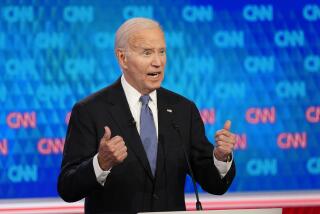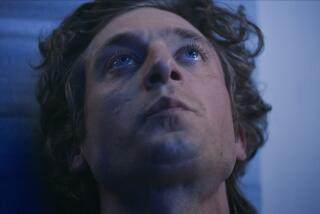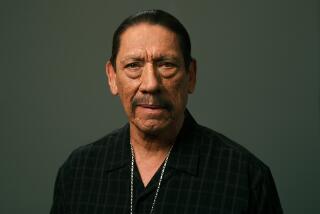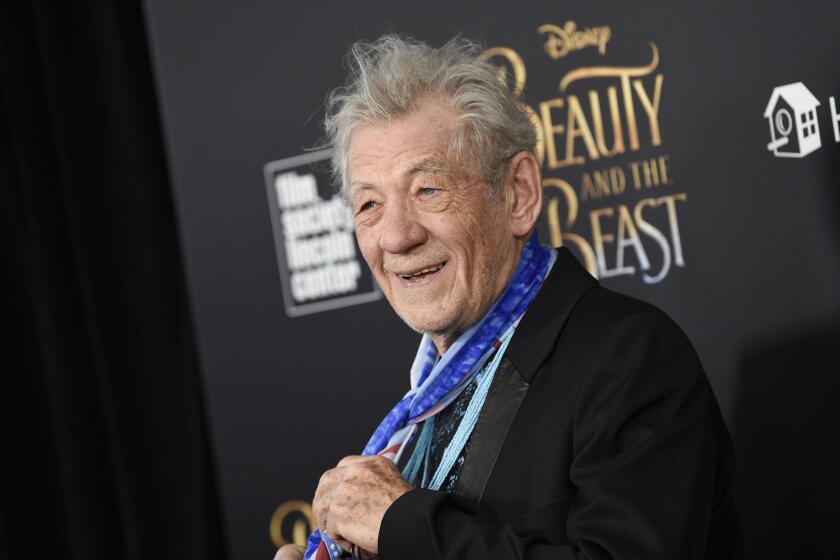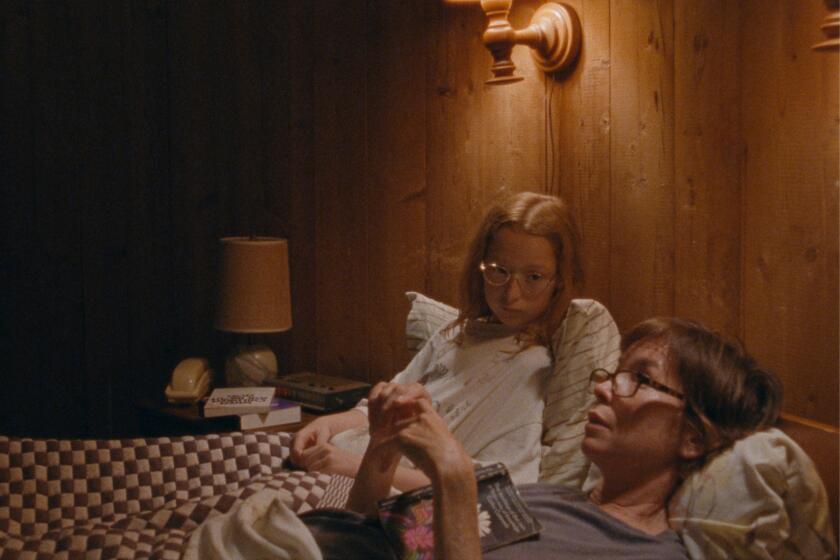‘The Gene Machine’
Picture three young, very broke actors struggling to make it Off-Broadway in the late 1950s--and still managing to have a good time of it. Classic leading men they were not: Dustin Hoffman, an odd-looking little guy but a real cut-up on stage; Robert Duvall, his intense and serious-minded roommate, and Gene Hackman, the married friend whose life seemed as steady and stable as his demeanor.
Slowly, each of the three close friends begins to achieve a measure of success on stage and screen. Then, in 1967, boom : “The Graduate” hits the screen and Hoffman is rocketed to stardom. Hackman also gets a part in the hit film, but he never makes it to the screen: He is fired by director Mike Nichols.
In the past, Hackman has expressed hurt and regret over losing that role, just as he has over several turns his long career has taken. But when all is said and done, none of those quirks of fate probably matter: Even if Hackman had played Mr. Robinson, it is unlikely that he would have achieved the same superstar status reserved for a lucky handful like Hoffman. He simply doesn’t have the same mysterious chemistry with film audiences--the kind that can command superstar prices from studios. (Hackman is believed to have received something less than $2 million for his latest film, “Mississippi Burning,” compared to the estimated $5-million salary Hoffman received for “Rain Man.”)
What Hackman does command--no matter where he appears--is respect, even awe, from his peers. With one Oscar on his shelf (for “The French Connection”) and two nominations already to his credit, for “Bonnie and Clyde and “I Never Sang for My Father,” many in Hollywood are predicting that Hackman will hear from the Academy once again next spring, this time for his portrayal of a Southern sheriff-turned-FBI agent in “Mississippi Burning.”
“Unquestionably he will get an Oscar nomination,” insists critic Gene Siskel. “That does not always indicate quality, but in this case it does.” And he may well be up against his pal Hoffman for “Rain Man.”
Hackman may not always be the favored choice among studio executives concerned with box-office draw. But he is a clear favorite among critics, directors and fellow actors.
Even when he makes bad movies--and critics like Siskel say he has made plenty of those--Hackman invariably receives praise for his performance. When stars are asked to name their favorite contemporary actor, Hackman’s name is commonly mentioned. He is known as an “actor’s actor.” “Everyone wants to work with him,” says Frederick Zollo, who produces stage plays and films, including Orion Pictures’ “Mississippi Burning.” “He has an ease, a naturalness on screen.” Says Orion executive vice president Mike Medavoy: “He’s an everyman. He brings a sense of reality to a film.”
With a receding hairline and the exaggerated features of a character actor, 58-year-old Hackman is best known for his roles as “the everyman,” an ordinary guy grappling with a moral or physical dilemma. But he brings to those roles a sense of inner turmoil and intensity. “I always manage to find a way in films to be a bit introspective,” Hackman explains. “It helps me as an actor, makes me feel as if I’m doing something important.”
With more than 40 films to his credit, Hackman is also one of the most prolific actors around. In October, the trade paper Variety listed him as the second busiest actor in Hollywood over the past few years, behind Steve Guttenberg. This winter alone, Hackman appears in four other films besides “Mississippi Burning.” He stars in “Full Moon in Blue Water,” “BAT 21” and “Split Decisions.” He also appears in Woody Allen’s “Another Woman.”
This week he begins filming on another Orion film, “The Package,” a political thriller. And next summer, he will make his directorial debut with “The Silence of the Lambs,” in which he also stars.
Off the screen, Hackman can be shy, even awkward--and eminently likable. During a recent American Film Institute tribute to him, he sat with his 6-foot-2 frame slumped in a chair and fidgeted nervously with his hands, clearly uncomfortable as the center of attention. “It must be nice for them out there to listen to us pat ourselves on our back,” he said to director Arthur Penn midway through the AFI retrospective of his work, held at the Cinetex conference in Las Vegas last fall.
In front of the camera, he is intense and focused--Zollo dubbed him “the Gene machine” during the filming of “Mississippi Burning.” “Invariably I will cross off all the stage instructions in a script,” Hackman says, “so when I come on stage I don’t have a preconceived notion of what it is I’m going to do. Ideally, I don’t even like to learn the lines until I get there, though sometimes that puts too much pressure on the other people involved.”
During those interminable periods of boredom on movie sets, Hackman might be found, pencil in hand, in front of a drawing pad. He sketches the prop handler, the electrician, anyone who will sit still for 20 minutes, and gives most of his drawings away to his subjects.
Hanging in his adobe home in Santa Fe, N.M., are some of Hackman’s paintings, done in a style he describes as Manet-style impressionism. “I feel a little embarrassed about it though,” he confesses. “Most of it is in the guest quarters--and we haven’t had guests yet.”
It is not unusual for people as shy as Hackman to pursue an acting career. “If you have some kind of disturbed childhood,” he says, “you go into (acting) to exorcise that, to point out who you are. . . . When I’m given a role that has a lot of darkness in it, it appeals to me. I soak right into that.”
The “darkness” of which Hackman speaks is a reference to his stormy relationship with his father, a pressman for a Danville, Ill., newspaper. “My dad was not a strong guy,” Hackman says. “He was weak, and he would overcome that by being too strong physically, by beating me. I resented it because the punishment didn’t fit the crime. Just because I didn’t carry the ashes out of the basement I would be beaten and restricted to my yard for a couple weeks.”
His father left Hackman, his mother and his month-old brother when Hackman was 13. Many years later, when his career as an actor was taking off, Hackman made an attempt at reconciliation. “But we never really could get to it,” Hackman says. His father died shortly after.
As a result of that relationship, Hackman says, “I’ve always had problems with authority.” During a stint in the Marine Corps as a teen-ager, Hackman was constantly reprimanded for insubordination. But he rarely raised his voice: Hackman was a surly, angry young man who never released steam from the volcano burning inside.
Even in the Marines, he found an outlet for his show-business aspirations when he became a disc jockey for his unit’s radio station. During his early 20s, he worked at several radio stations before striking out for California to train as an actor at the Pasadena Playhouse, where he first met Hoffman.
He landed in New York at age 25 after the playhouse asked him to leave--not enough potential, he was told. He met Duvall in summer stock and the three of them ended up as fast buddies. The trio had a lot of laughs, Hackman recalls, like the times they helped Hoffman improvise his role as a toy demonstrator at Macy’s. And they lent support to one another during the years of struggle. “Bobby and I especially were so frightened about getting an agent,” Hackman says. “We had this made-up list of things we had done that we would slip under their door before racing off. “
In his book “Adventures in the Screen Trade,” screenwriter William Goldman (“All the President’s Men,” “Butch Cassidy and the Sundance Kid”) describes how role choices, and twists of fate, can make or break a star. Throughout his career, Hackman, by his own accounting, has made plenty of bad choices. Still, his reputation has remained intact.
During the 1970s, Hackman turned down major roles in “Ordinary People” and “Apocalypse Now” because the compensation wasn’t high enough. But he accepted roles in such forgettable films as “Lucky Lady” (for which he received more than $1.35 million) and “March or Die. “ Even the current crop of films bearing his name--with the glaring exception of “Mississippi Burning”--are disappearing without much of a heartening response from critics or audiences. Associates say Hackman is prolific because of his love of the work; they also cite financial reasons and predict that he’ll slow down after this current rash of films.
In the mid-’70s, when Chicago Tribune critic Siskel asked Hackman about his film choices, the actor responded with a comment that Siskel today considers “the single most important quote about the pressures of stardom.” Hackman told the critic: “I was trained to be an actor. I was not trained to be a star. I took lessons in acting, not lessons in how to deal with agents and lawyers and investment advisers or, frankly, with you, the press.”
At the time he made that comment, Hackman was deeply depressed about the poor box-office reception for two of his proudest achievements--”The Conversation” and “Scarecrow,” consistent favorites among film buffs. Fourteen years later, Hackman cites his role as the tormented surveillance expert in “The Conversation” as his favorite. “He appealed to a lot of things in me, a sort of malaise I have in me, a sort of darkness, a suspiciousness and paranoia.”
After the box-office failure of those two films, Hackman decided to go for big money. Under his then-agent Sue Mengers, Hackman’s fee began to rise, hitting the million-dollar mark in the late ‘70s. In addition to less memorable films, Hackman appeared in hits like “The Poseidon Adventure,” “Superman” and “Superman II.”
Then, in 1977, Hackman dropped out. “I was burned out,” Hackman says now. “I was really at the end of my line, really tired.” He spent the next couple years with his art, flying lessons and three children. (Hackman’s 30-year marriage to Faye Maltese ended three years ago after a lengthy separation.)
Since 1980, though, when he returned with “All Night Long,” Hackman has worked steadily. But he has stayed out of Hollywood. He lived in Santa Barbara before moving to Santa Fe two years ago. Most of his friends, he says, are writers and artists, not in “the business.”
How does Hackman top Hackman? The actor says he is anxious to play characters with, well, a little class. “I would like to do things with a little more polish to them,” he says, “to wear great clothes, to have a certain manner, to use the language better, to be moneyed or educated or whatever--so I’m not the mug all the time.”
More to Read
The biggest entertainment stories
Get our big stories about Hollywood, film, television, music, arts, culture and more right in your inbox as soon as they publish.
You may occasionally receive promotional content from the Los Angeles Times.
